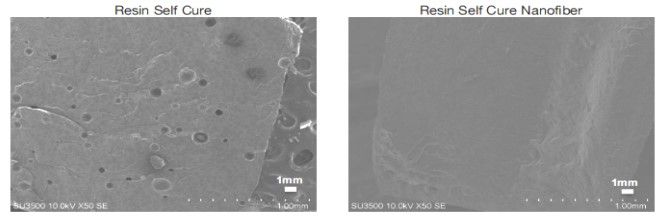Abstract:
Background: Porosity of resin material is significantly influencing the biocompatibility of dental prostheses, because it compromise the mechanical properties, water sorption, and biofilm formation. Conventional Self-cure Acrylic Resin (SC-ARc) has been using for dental prostheses due to its economical values and ease handling properties. The drawback is SC-ARc has more porosity than heat-cure acrylic resin. In this previous study, Polyacrylonitrile polymethyl methacrylate electrospinning nanofibers (e-nanoPAN-PMMA) as reinforcement materials was added to produce nano SC-AR (SC-ARnano). The flexural strength (FS) and flexural modulus (FM) of SC-ARnano were significantly increased (P≤0.05).
Objective: This study aimed to evaluate the effect of adding 1 w% e-nanoPAN-PMMA on the porosity phenomena of SC-AR.
Methods: SC-AR samples were divided into two groups: SC-ARc and SC-ARnano group (n=5). Surface porosity morphology was analyzed by SEM. Chemical characterization was conducted by XRD and FTIR.

Results: SEM of surface fracture morphology showed almost no porosity was found on the surface of SC-ARnano Typical resin polymer graph patterns were observed by XRD in both samples. FTIR graph showed some chemical interactions for SC-ARnano.
Conclusion: Mechanical properties improvement of SC-ARnano alter the chemical and physical characteristic of resin. The physical characteristic observed by SEM on the surface of SC-ARnano shows no porosity compare to SC-ARc; therefore, it was biocompatible for biomedical applications.
Biography:
Ira Artilia graduated from Padjadjaran University in Indonesia and Graduate School of Dental Study at Kyushu University in Japan. She currently works as a lecturer and researcher at the Faculty of Dentistry Jenderal Achmad Yani University in Cimahi, Indonesia. Her research related to the resin, bone substitute material, apatite cement, dental medicament, nanofiber and polymer.
Copyright 2024 Mathews International LLC All Rights Reserved